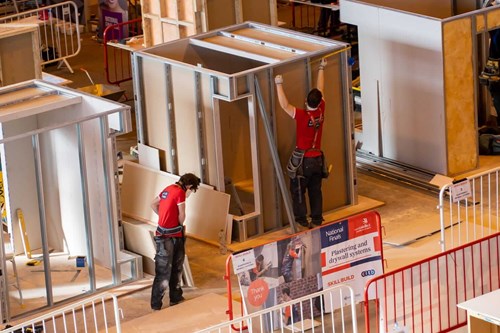Apprenticeships in England
Apply for apprenticeships in England
Plasterers smooth or create a decorative finish on internal walls and ceilings. They also apply render and finishes to external walls. Most new builds and many renovation projects require a plasterer, to give a room a fresh feel, repair damage or bring a space back to life.
£19000
-£35000
43-45
52,100
There are several routes to becoming a plasterer. You can gain the qualifications you need by doing a college course, an apprenticeship or on the job training.
You should explore these routes to find out which is the right one for you. Although some of these options will list qualification requirements many employers are more interested in people who are enthusiastic, willing to learn and able to follow instructions.
You may need a Construction Skills Certification Scheme (CSCS) card to work on a construction site.

Your local college or training provider may offer plastering courses. You could study for a Level 1 Award in Construction Skills – Plastering, Level 2 Diploma in Plastering or Level 3 Advanced Technical Diploma in Plastering.
Find out what the entry requirements are where you live
If you are aged between 16 and 24 you may be eligible for a traineeship. This is a short course (2 weeks - 6 months) which helps you to gain work experience in your chosen role.
An apprenticeship with a construction firm is a good way into the industry.
Apprenticeships are open to anyone over the age of 16. As an apprentice, you will be fully employed by your company and expected to work a minimum of 30 hours a week. Your time will be split between on-the-job experience and a college or training provider.
An intermediate plastering apprenticeship takes around two years to complete. If your employer can provide you with the right experiences you can progress onto a Level 3 qualification.
Find out what the entry requirements are where you live
An experienced plasterer may offer you work as a labourer to start you on your career path. Your employer may then provide training so you can become a plasterer.
If they are a member of the Construction Industry Training Board (CITB) your employer may be able to claim a grant towards your employment. The government also offers grants for employers who take apprentices.
Work experience is essential to gaining employment within the construction industry. You could gain this at school, or by working weekends and holidays with a company or relative who works in construction. Potential employers will always be pleased to see work experience listed on your CV.
Additional skills which may benefit anyone considering a job as a plasterer include:
To become a plasterer you could:
To become a plasterer you could:
To become a plasterer you could:
As a plasterer you will be responsible for helping to ensure a smooth and clean finish to buildings. This can involve mixing the plaster and applying to walls or ceilings, or drylining.
The job role of a plasterer involves the following duties:

Ade Danson
Ade Danson is a director of Lime Plasterers Ltd.
The expected salary for a plasterer varies as you become more experienced.
Hours and salary depend on location, employer and any overtime you may do.
* Salaries have been collected from multiple industry sources
Check out the latest plasterer vacancies:
As these are external websites, the number of vacancies related to your preferred role may vary. New opportunities will be posted as they come up.
If you work as part of a team you could progress into a supervisory role to earn a higher salary. You could also move into a related area such as drylining, ceiling fixing or become a partitioning systems operative.
You could specialise to become a construction site engineer or technician, or set up as a self-employed subcontractor.
Explore the progression opportunities below